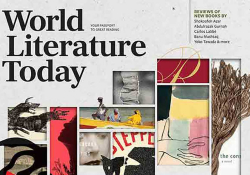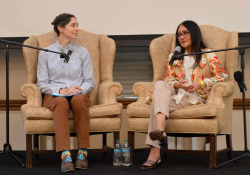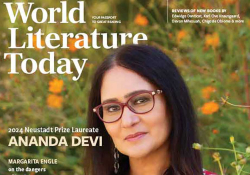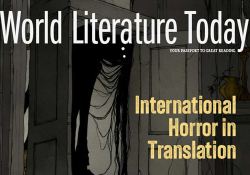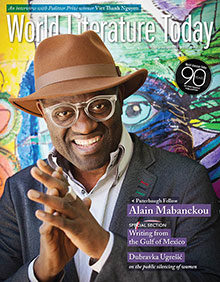Editor’s Note
In a country as big as America it is as impossible to prophesy as it is to generalize, without being tripped up, but it seems to me that there is room for hope as well as mistrust. The epic loses all its glory without the dream.
– James Truslow Adams, The Epic of America (1931)

Throughout 2016, we’ve been celebrating World Literature Today’s ninetieth year of continuous publication. Our actual birthday? October 21, 1926. On that day, founding editor Roy Temple House (1878–1963) wrote to University of Oklahoma president William Bennett Bizzell to pitch his idea for a “journal of information as to current foreign books,” to be distributed free of charge. Dr. House modestly requested $150 to produce the first two issues, plus another $100 for a special typeface to accommodate foreign book titles. At the time serving as chair of OU’s Department of Modern Languages, House had seen firsthand the devastating effects of World War I in Europe and was concerned about the United States’ growing isolationism in the 1920s.
The story of Books Abroad—the forerunner of World Literature Today—achieves greater relief when set against the backdrop of the broader advances of the University of Oklahoma at the time. Under the leadership of President Bizzell, OU’s fifth president, the university was growing by leaps and bounds, both physically and academically. During Bizzell’s tenure, a new main library, the Oklahoma Memorial Union, the liberal arts building known as Buchanan Hall (home to Books Abroad for many years), and the football stadium were built, and the OU Press was founded under the direction of Joseph A. Brandt, all this despite “political opposition from Gov. William H. Murray and increasingly smaller fiscal appropriations” (Encyclopedia of Oklahoma History & Culture). David W. Levy has called these “eight years of plenty” (1923–30) “a kind of golden age in the history of the university” (The University of Oklahoma: A History, vol. 2). Brandt served as Books Abroad’s managing editor for several years and later returned to OU to become its sixth president upon Bizzell’s retirement. (David L. Boren, as OU’s thirteenth and current president, would usher in a new golden age beginning in the mid-1990s.)
Less than a week after receiving House’s letter, President Bizzell forwarded it to historian Roy Gittinger, dean of administration, writing: “I have talked this matter over with Dr. House and am impressed with the general plan that he has outlined. The expense does not seem to be very great considering the importance of the undertaking” (October 25, 1926). Between them, Bizzell, Gittinger, and House—a Texan, Iowan, and Nebraskan, respectively—brought “Light from Abroad” (the journal’s motto) to the Southern Plains, reflecting it back to the world.
In an appendix to Dr. Gittinger’s history of the first fifty years of the University of Oklahoma, he includes the following curious excerpt from The Epic of America (1931), by James Truslow Adams, one-time chancellor of the American Academy of Arts & Letters: “America is yet ‘The Land of Contrasts,’ as it was called in one of the best books written about us, years ago. One day a man from Oklahoma depresses us by yawping about it in such a way as to give the impression that there is nothing in that young State but oil wells and millionaires, and the next day one gets from the University there its excellent quarterly critical list of all the most recent books published in France, Spain, Germany, and Italy, with every indication of the beginning of an active intellectual life and intelligent play of thought over the ideas of the other side of the world. There is no better omen of hope than the sane and sober criticism of those tendencies in our civilization which call for rigorous examination.”
By all accounts, Roy Temple House was a “sane and sober” critic of the tendencies he saw happening around him at the time. Over the past nine decades, his vision of a journal that would “foster contributions to the scholarly and cultural activities of the nation” has been brilliantly fulfilled.
Daniel Simon
